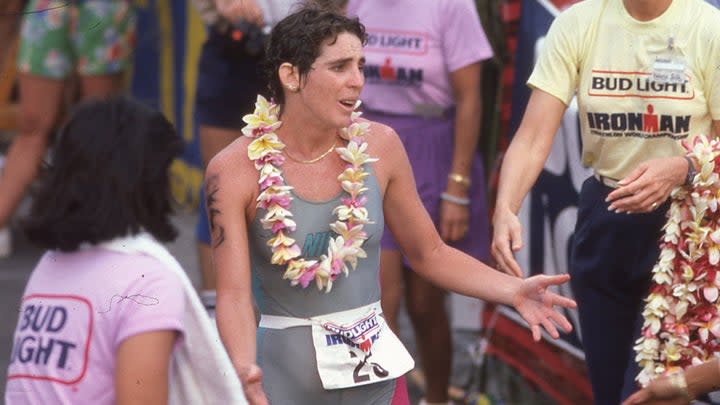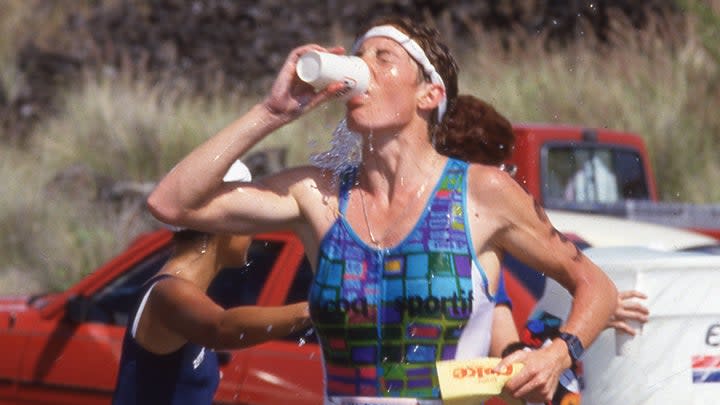The Rivalry That Changed Women’s Triathlon Forever
This article originally appeared on Triathlete
The mood in the studio for the 1990 cover shoot of Competitor magazine was intense--and even that may be putting it mildly. Erin Baker and Paula Newby-Fraser, the top women in the sport of triathlon, posed for a variety of portraits in a variety of outfits. They stood back-to-back and looked at the camera, looked at the photographer, looked at anywhere and everywhere but directly at each other. That simply could not and would not happen.
"During a two-hour shoot, not one word was spoken," recalled then-editor-in-chief Bob Babbitt. "There was tension in the air that I'd never felt before at any photo shoot."
Rivalries are part of just about every sport: Joe Frazier versus Muhammad Ali, Chris Evert versus Martina Navratilova, and the Boston Red Sox versus the New York Yankees are just a few of the most famous examples of how legends are made when when great athletes face off. The high stakes and even higher drama of sport rivalries push good athletes into greatness, and the result often resonates through sport as a whole. For women's triathlon, that epic rivalry was Baker of New Zealand and Newby-Fraser of South Africa: an intense, years-long face-off fueled by identity, politics, and polarizing personalities. Their disdain for each other came to a head every time they met on a race course, fueling passionate performances that changed the sport forever.

The rivalry originated at the Ironman World Championships in 1986, when Newby-Fraser became the first woman to break 10 hours at an Ironman. Her course record of 9:49:14 eclipsed the previous record by more than 36 minutes, shocking everyone--including the champion herself:
"I had barely been in sport," recalled Newby-Fraser. "It was only my second Ironman, and I was hard pressed to find any wins against the top women at the time. Sylvianne Puntous, Joanne Ernst--those were the dominant forces, along with Erin Baker, who was dominating in all long and short-course events all around the world."
RELATED: Recalled: The Puntous Twins Dominate the Early 80s
The 1986 event was Newby-Fraser's best race to date; simultaneously, it was Baker's worst.
"I had been winning nearly every race I entered, with more than 35 professional victories," said Baker. "The only real blemish on my record was a DNF in Kona in 1986. I went over there very, very ill, but felt a responsibility to my sponsors to perform well there. It was disastrous, and my only DNF up to that point."
The DNF stung, but not as badly as the feeling of losing to Newby-Fraser. Their complex enmity paralleled their home countries: Baker's New Zealand was locked in an intense conflict with Newby-Fraser's South Africa. The two countries' conflicting viewpoints over apartheid extended out of diplomatic discussions and into sports--at first, the rugby field, and later, triathlon.
"In New Zealand in the early 80s, there was a very nationalistic attitude that apartheid was wrong and that we should make a strong stand against it," recalled Baker. "My mother and I were often at protests in New Zealand to prevent the Springboks (South African rugby team) from coming to New Zealand, as the South Africa government and white apartheid citizens of South Africa were fanatical rugby fans."
At one such protest, Baker was arrested and banned from traveling to the United States for five years. Meanwhile, in response to growing anti-apartheid sentiment around the world, travel and opportunity was taken away from all South Africans, across every sphere of sports and general travel to many countries. Newby-Fraser was able to skirt the sanctions by switching representation to her country of birth, Zimbambwe.
"Her arrest at that demonstration gave her a record that would prevent her from getting a visa to come to the U.S. for many years," said Newby-Fraser. "As an athlete--a white, South African athlete--the rivalry was initiated on her end. The sanction against white South African athletes was something she felt should apply also to myself. My mother was extraordinarily political in her fight against apartheid in South Africa. That's what made Erin's objection to me so silly, really--had she even taken the time to speak with me, she would have understood more."
Baker's animosity simmered for years as she raced--and dominated--the European circuit. When she was finally granted a visa to travel to the United States to race the Ironman World Championship in 1986, she saw an opportunity to make a statement.
"Although I didn’t personally think Paula was a bad person, as I knew nothing about her, I did think whupping the ass of the top South Africa triathlete would get some attention back in South Africa," said Baker.
After a failed attempt to do so in 1986, there was no option for Baker but to win in 1987. Her strategy to beat Newby-Fraser was to do what no woman had ever done at the Ironman World Championships: run the entirety of the marathon without taking walk breaks. It worked, as Baker shattered Newby-Fraser's course record with a time of 9:35:25 to take the win and new course record.
"To be frank, in 1987, I still did not think it was comprehensible to run the full marathon," recalled Newby-Fraser of the race. "The loss to Erin late in the event in 1987 whilst walking through aid stations showed what was possible."

"When Erin won in 1987, people wondered if Paula had been lucky in 1986," recalled Babbitt.
That lack of belief stung for Newby-Fraser, who silently vowed to reclaim the podium spot in 1988 to prove everyone wrong. Baker was not so silent about continuing to win. The two were polar opposites in most every way, from their approaches to training to their demeanor at races.
"Erin's reputation definitely preceded her," said fellow pro Karen Smyers. Baker was outspoken and assertive, pointing out injustices when she saw them. When it was announced that the inaugural ITU World Championship in 1989 would have a larger prize purse for men than women, Baker confidently (and successfully) led the charge for equal pay.
"Erin's sheer athletic talent and force of personality was motivating, because it was so contrary and so loud and strong," said Newby-Fraser. "She was so out there-where I would never dare to speak up or verbalize my will to win, as strongly as it was there."
"I did try to get into her head once in a while," said Baker. "That sort of gamesmanship was part of my DNA for sure."
Their rivalry escalated for years. Almost every time they raced, records dropped and fires were fueled: Newby-Fraser, motivated by what she experienced at the 1987 race, went all-in on her training, and it paid off in the form of a new record of 9:01:01 at the 1988 Ironman World Championship. Baker finished second, eleven minutes behind. In 1990, Baker won the duel; in 1991, Newby-Fraser. Just as in 1987, the marathon would prove to be the crucial element in every race thereafter, with the winner being the one who clocked the fastest run of the day.
"The interesting dynamic in their race rivalry was that they never really had what I would call the epic duel where they were both on their game on the same day," said Mark Allen, who raced in the men's pro field during the same era and was friends with both Baker and Newby-Fraser.
"They traded victories over the years there, and at the end of the day it always seemed to be a game of mental strength and confidence that either made or broke their day. From the outside looking in, the one who was the better of the two in each of those matchups was the one who seemed to have the headspace just right on the day and the other seemed to be in a much less confident position within."
"I got to witness the Paula and Erin rivalry firsthand when I stopped in Hawaii on my way home from the ITU World Championships in Australia in 1991 to see what this 'crazy' Ironman thing was all about," said Smyers, a short-course specialist at the time. "My impression of the Ironman at that time--before internet and social media--was that it was a grueling test of survival that mostly required a lot of suffering and plodding along through heat and humidity. That didn't really interest me, as I loved training to go fast at the Olympic distance. But when I watched Paula and Erin race each other head-to-head and saw the pace they were going the entire time, and the excitement of Erin trying to reel Paula in on the run after Paula unleashed one of her patented, blazing bike rides, I was smitten. This was a race, not just a sufferfest."
RELATED: A Brief History of Women in Triathlon
At the 1993 Ironman World Championship race, the conflict between the Baker and Newby-Fraser was so intense, Newby-Fraser considered retirement; after beating Baker, she remarked, "I don't know if I can do this again."
"It was a rivalry that brought out amazing performances from both of them," said Smyers. "Which is exactly what competition is all about--providing the motivation to continually push yourself to new levels."
In 1993, it was the last time the two would race each other. Baker retired in 1994 to focus on her passion for politics. In 1998, she was elected to the city council in Christchurch, New Zealand and went on to serve on the boards of several organizations in New Zealand. Newby-Fraser continued to race into the early 2000s (including against Smyers, who overtook Newby-Fraser for the title at the 1995 Ironman World Championship).
"We don’t have any relationship at all now, and haven’t for 25 years," said Baker. "I think we parted ways with a genuine mutual respect for each other’s abilities, tenacity and work ethic."
"I truly believe that those many years ago, we compartmentalized in the way that drove each of us to try and bring out the best athletically to win on the sport's biggest stage. I focused in, she poured herself outward," said Newby-Fraser. "Age, life and a good bottle of wine would make for a sensational conversation now. Much has changed, but much is the same at its core I suspect."
"The rivalry between the two pushed them to wins and record-breaking moments. They changed the way women raced forever," said Babbitt. "They pushed each other to be great. And they were."
RELATED: Erin Baker: Rebel Without a Cause
For exclusive access to all of our fitness, gear, adventure, and travel stories, plus discounts on trips, events, and gear, sign up for Outside+ today.

